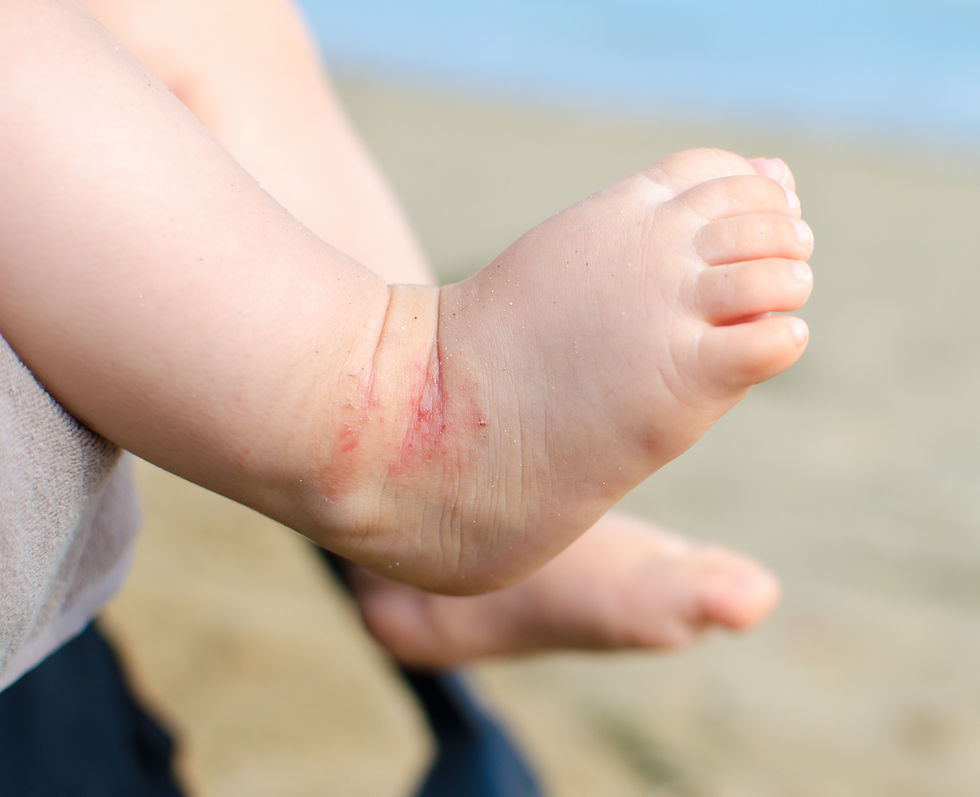THE ORGANIC SWITCH
- Olivia Yves
- Nov 10, 2018
- 4 min read
Updated: Jan 16, 2019
It goes without saying that parents want the absolute best for their little ones. But how to choose "the best" often comes with some major decisions and worries: breastfeeding versus bottle feeding, stay-at-home parent versus day care, attachment parenting versus babywise parenting, organic versus conventional — Parenting debates often inspire passionate pro and con positions. Deciding whether or not to spend more money for organic is consistently a dilemma for parents. Add GMOs to the mix, and you really start to see the debate heating up.
Take a deep breath. By researching things like organic cotton or organic baby formula, you are already doing your part to ensure you make the best decision for your baby. Check out these benefits of organic baby products to determine if you should make the switch.
In terms of baby health, we never cut corners. Staying healthy, eating well, and getting a good night’s sleep are all cornerstones of a well-balanced, satisfied baby. Just like they are for all the rest of us.
We all know the importance of staying fit, eating healthy, buying smart. We make sure to read the ingredients of the food we buy, to check there aren’t any additives, chemicals, or potentially harmful substances. When we buy skincare or makeup, we check the label to ensure the stuff we’re putting on our face is natural, healthy, and worthy of our money. But do we give enough thoughts to something else we’re putting on our bodies and our babies’ bodies?

As a parent, you know just how many onesies a baby can go through on an average day. Between the spit-up incidents and leaky diapers, a lot of different fabric touches your baby’s skin every day. Among them, cotton should be the most commonly used in all baby products and clothing, as it’s gentle, natural, and won’t irritate the little one's delicate skin.
Cotton-rich clothing (anything over 80% cotton) seems to be a better solution for physical body as well as spirit for a lot of reasons:
Sleep Better and Stay Cooler
Research proves we get a better night's sleep on cotton sheets than those made from oil-based synthetic fabrics, like polyester. Because cotton is soft and absorbent, it naturally allows our skin to breathe and won't trap heat under the sheets. It keeps our body temperature cool during the night and makes sure our precious sleep isn’t disrupted. Not to mention that moisture-wicking cotton clothing is specially designed to keep your baby drier and cooler to prevent heat rash.
Natural and Hypoallergenic
This little fluffy plant has been grown and used to make clothes for around seven thousand years, all over the world. It breathes and absorbs moisture. It’s soft and hypoallergenic, whereas synthetic fibers are much more likely to irritate your skin, whether or not you’re prone to allergies. It is natural and more sustainable than so many other synthetic fibers and materials.
Cling-Free
Cotton is a lot of things, but it’s definitely NOT clingy! Static cling can be blamed for many embarrassing fabric fails, but cotton is never the culprit because it can’t hold an electric charge. Want cling-free clothes? Stick with cotton.
So, if your clothes are itchy, irritating, stiff or clingy, read your label because your clothing may not be cotton-rich. Learn about what determines comfort in a fiber.
Researches and studies have proven that cotton is beneficial to our body, and it is truly one of the commonly worn fabrics in our daily use.

Cotton is like our daily necessity, food, which is grown from plants too. How it was grown represents how safe it could be as an end product.
Cotton makes up about half of the fiber used in clothing and textiles, with 20 million tons produced worldwide each year. It is mostly grown in monoculture and is a very pesticide-intensive crop. Although cotton accounts for only 2.5% of the world’s agricultural land, it accounts for 25% of all the insecticides, 11% of all pesticides, and 6.8% of all herbicides used worldwide. All those chemicals have a major impact, both on you as the consumer, and on the world as a whole.
The side effects of pesticides can be overwhelming. Simply check out "How does cotton affect people and the environment".

Like organic food 20 years ago, the idea of organic cotton is confusing to many of us. It’s taken a little longer to catch on because the correlation isn’t as direct. We don’t eat cotton fiber (at least we hope you don’t!). However, more people are becoming knowledgeable as to how the organic cotton movement is just as powerful and important as that of organic foods.
“Textile Exchange believes that consumers who care about the environment and the farming communities which produce the cotton for their clothing, should support brands and retailers using organic and preferred cotton,” advocates Ms. Liesl Truscott, Materials Strategy Director for the Textile Exchange.
Babies’ skin is much more delicate than ours. It is thinner and noticeably more porous, which means it effortlessly absorbs everything it comes into contact with. Since clothing directly touches a baby’s skin, day in and day out, it makes sense to eliminate chemicals in those materials. By choosing organic clothes, we reduce the amount of chemicals that are absorbed into our baby’s body, lowering the overall chemical contact for our little one.
Whether you are ready to join the organic movement, or if you are for cotton, make sure you go Green for babies!


Comments